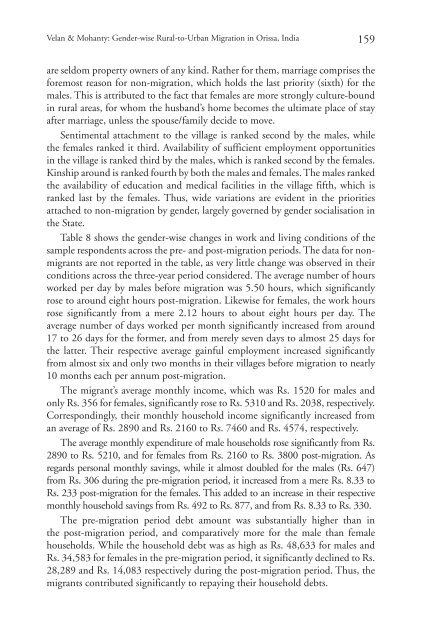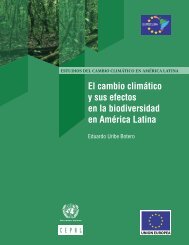Inequality and Climate Change Inégalité et changement climatique
Inequality
Inequality
You also want an ePaper? Increase the reach of your titles
YUMPU automatically turns print PDFs into web optimized ePapers that Google loves.
Velan & Mohanty: Gender-wise Rural-to-Urban Migration in Orissa, India 159<br />
are seldom property owners of any kind. Rather for them, marriage comprises the<br />
foremost reason for non-migration, which holds the last priority (sixth) for the<br />
males. This is attributed to the fact that females are more strongly culture-bound<br />
in rural areas, for whom the husb<strong>and</strong>’s home becomes the ultimate place of stay<br />
after marriage, unless the spouse/family decide to move.<br />
Sentimental attachment to the village is ranked second by the males, while<br />
the females ranked it third. Availability of sufficient employment opportunities<br />
in the village is ranked third by the males, which is ranked second by the females.<br />
Kinship around is ranked fourth by both the males <strong>and</strong> females. The males ranked<br />
the availability of education <strong>and</strong> medical facilities in the village fifth, which is<br />
ranked last by the females. Thus, wide variations are evident in the priorities<br />
attached to non-migration by gender, largely governed by gender socialisation in<br />
the State.<br />
Table 8 shows the gender-wise changes in work <strong>and</strong> living conditions of the<br />
sample respondents across the pre- <strong>and</strong> post-migration periods. The data for nonmigrants<br />
are not reported in the table, as very little change was observed in their<br />
conditions across the three-year period considered. The average number of hours<br />
worked per day by males before migration was 5.50 hours, which significantly<br />
rose to around eight hours post-migration. Likewise for females, the work hours<br />
rose significantly from a mere 2.12 hours to about eight hours per day. The<br />
average number of days worked per month significantly increased from around<br />
17 to 26 days for the former, <strong>and</strong> from merely seven days to almost 25 days for<br />
the latter. Their respective average gainful employment increased significantly<br />
from almost six <strong>and</strong> only two months in their villages before migration to nearly<br />
10 months each per annum post-migration.<br />
The migrant’s average monthly income, which was Rs. 1520 for males <strong>and</strong><br />
only Rs. 356 for females, significantly rose to Rs. 5310 <strong>and</strong> Rs. 2038, respectively.<br />
Correspondingly, their monthly household income significantly increased from<br />
an average of Rs. 2890 <strong>and</strong> Rs. 2160 to Rs. 7460 <strong>and</strong> Rs. 4574, respectively.<br />
The average monthly expenditure of male households rose significantly from Rs.<br />
2890 to Rs. 5210, <strong>and</strong> for females from Rs. 2160 to Rs. 3800 post-migration. As<br />
regards personal monthly savings, while it almost doubled for the males (Rs. 647)<br />
from Rs. 306 during the pre-migration period, it increased from a mere Rs. 8.33 to<br />
Rs. 233 post-migration for the females. This added to an increase in their respective<br />
monthly household savings from Rs. 492 to Rs. 877, <strong>and</strong> from Rs. 8.33 to Rs. 330.<br />
The pre-migration period debt amount was substantially higher than in<br />
the post-migration period, <strong>and</strong> comparatively more for the male than female<br />
households. While the household debt was as high as Rs. 48,633 for males <strong>and</strong><br />
Rs. 34,583 for females in the pre-migration period, it significantly declined to Rs.<br />
28,289 <strong>and</strong> Rs. 14,083 respectively during the post-migration period. Thus, the<br />
migrants contributed significantly to repaying their household debts.





